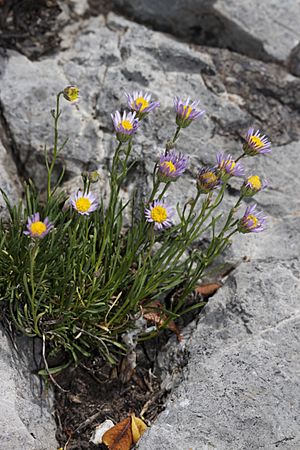Sand fleabane facts for kids
Quick facts for kids Sand fleabane |
|
|---|---|
 |
|
| Scientific classification | |
| Genus: |
Erigeron
|
| Species: |
arenarioides
|
| Synonyms | |
|
|
Erigeron arenarioides, also known as sand fleabane or Wasatch fleabane, is a special kind of flowering plant. It belongs to the daisy family, which includes many familiar flowers like sunflowers and dandelions. This plant is quite rare. It has only been found in the northern part of Utah in the western United States.
Contents
Discovering the Sand Fleabane Plant
The sand fleabane is a unique plant that grows in specific areas. It was first described in 1871. Its scientific name, Erigeron arenarioides, helps scientists around the world know exactly which plant they are talking about.
What Does Sand Fleabane Look Like?
The sand fleabane is a perennial plant. This means it lives for more than two years, often coming back year after year. It can grow up to 30 centimeters (about 1 foot) tall. Imagine a ruler standing upright – that's how tall it can get!
Its Flowers and Leaves
This plant usually has several flower heads. These are not single flowers, but rather a cluster of many tiny flowers grouped together. Each flower head has 10 to 25 blue ray florets. These are the petal-like parts that spread out from the center.
In the middle of these blue "petals" are many small yellow disc florets. These are the tiny, tightly packed flowers that form the center of the flower head. The plant's Latin name, arenarioides, means "sandwort-like." This refers to its narrow, thin leaves, which look similar to another plant called sandwort.
Where Does Sand Fleabane Grow?
The sand fleabane is native to the northern parts of Utah. It thrives in specific environments, often found in sandy or rocky areas. This is why it's called "sand fleabane." Its ability to grow in these tough conditions makes it a resilient plant.

